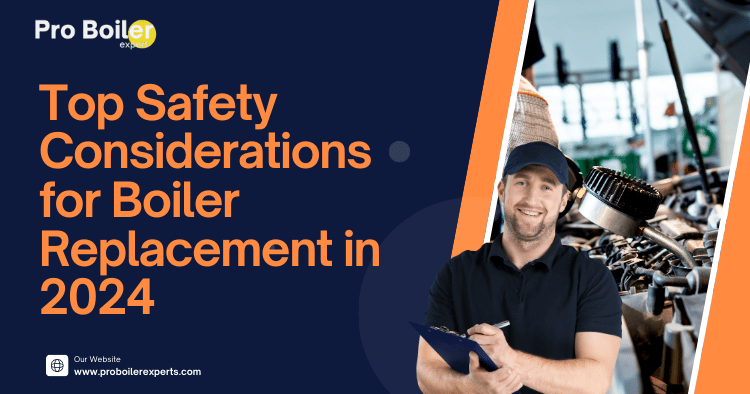Table of Contents
- Understanding Your Boiler System
- Choosing the Right Professional
- Safety Regulations and Compliance
- Selecting the Right Boiler Type
- Proper Ventilation and Exhaust Systems
- Regular Maintenance and Inspections
- FAQs
Understanding Your Boiler System
Before you embark on replacing your boiler, it’s essential to understand the existing system. Knowing how it operates and its age can significantly influence your decisions. Most boilers can last anywhere from 10 to 20 years, depending on maintenance and usage. If your boiler is approaching the end of its lifespan, consider these factors:
- Type of Boiler: Is it a conventional, combination, or system boiler? Each has unique installation requirements and safety considerations. For a deeper understanding of the benefits of different types, check out Top 5 Benefits of Choosing Combi Boilers for Your Home and Top 5 Benefits of Choosing a System Boiler for Your Home.
Understanding your current boiler system is the first step toward a safe and efficient replacement.
- Efficiency Levels: Older boilers tend to be less efficient, which can lead to higher energy costs and increased safety risks. You can learn more about efficient options in Top 5 High-Efficiency Boilers for Optimal Home Comfort.
Tip: Use resources like Energy.gov to learn more about different boiler types and their efficiency ratings.
Choosing the Right Professional
Selecting a qualified technician is crucial for safe boiler replacement. A skilled professional ensures that the installation complies with safety standards and operates efficiently. Here are key points to consider:
- Licensing and Certification: Ensure the contractor is licensed and certified to perform boiler installations. This guarantees their expertise and provides peace of mind.
Hiring the right professional can make all the difference in ensuring a safe and compliant boiler installation.
- Experience: Look for technicians with experience in replacing your specific type of boiler.
- References and Reviews: Check online reviews and ask for references from previous clients. A reputable contractor will have positive feedback.
Visual Aid: Here’s a simple checklist to help you find a qualified technician:
| Criteria | Yes | No |
|---|---|---|
| Licensed & Insured | [ ] | [ ] |
| Certified Boiler Expert | [ ] | [ ] |
| Positive Client Reviews | [ ] | [ ] |
| Years of Experience | [ ] | [ ] |
Safety Regulations and Compliance
When replacing a boiler, adherence to local and national safety regulations is non-negotiable. Familiarize yourself with the following:
- Building Codes: Local building codes dictate installation requirements for boilers. Check with your local municipality for specific guidelines.
Compliance with safety regulations is essential for a successful boiler replacement.
- Manufacturer Guidelines: Always follow the manufacturer’s instructions for installation and maintenance. This ensures safety and maintains the warranty.
- Regular Inspections: Some regions require regular inspections of new installations to ensure ongoing compliance with safety standards.
For more information on safety regulations, visit OSHA.gov.
Selecting the Right Boiler Type
Not all boilers are created equal. Choosing the right system can directly impact safety. Here’s what to consider:
- Fuel Type: Determine whether you want a gas, electric, or oil boiler. Each has different safety implications, particularly concerning ventilation and exhaust. For a comparison of fuel types, refer to Top Fuel Types for Your Next Boiler Guide.
Choosing the right fuel type can prevent many safety hazards associated with boiler operation.
- Size and Capacity: An oversized boiler can lead to short cycling, while an undersized one can cause overheating. Both scenarios pose safety risks.
- Energy Efficiency: Opt for ENERGY STAR® rated models, which are designed with safety features that minimize risks. Explore options in Top 5 Energy Efficient Heating Systems for Your Home.
Tip: Consult with your technician about the best boiler type for your home’s needs.
Proper Ventilation and Exhaust Systems
Proper ventilation is essential for safe boiler operation. Inadequate ventilation can lead to dangerous carbon monoxide buildup or other hazardous conditions. Consider these factors:
- Ventilation Requirements: Ensure your new boiler has adequate air supply for combustion. Most modern boilers require specific airflow levels.
Proper ventilation is not just a recommendation; it’s a requirement for ensuring the safety of your home and family.
- Exhaust Systems: Check that the exhaust system is clear and functioning properly. A blocked flue can result in dangerous gases entering your home.
- Carbon Monoxide Detectors: Install CO detectors near your boiler and throughout your home to alert you to any potential leaks.
Visual Aid: Here’s a simple checklist for boiler ventilation:
| Ventilation Aspect | Check |
|---|---|
| Adequate Air Supply | [ ] |
| Clear Exhaust System | [ ] |
| CO Detectors Installed | [ ] |
Regular Maintenance and Inspections
Once your new boiler is installed, regular maintenance is vital for safety and efficiency. Here’s what you should do:
- Annual Inspections: Schedule yearly inspections with a qualified technician. This can catch potential safety hazards before they become serious.
Regular maintenance is your first line of defense against unexpected boiler issues.
- Routine Maintenance: Regularly check for leaks, strange noises, or irregular performance. Address these issues immediately.
- Flush the System: Periodically flush your boiler to remove sludge and scale buildup, which can impede performance and safety. For essential maintenance tips, see Essential Boiler Maintenance Tips: Keep Your System Efficient.
For detailed maintenance guidelines, refer to Consumer Reports.
FAQs
1. How often should I replace my boiler?
Boilers generally last between 10 to 20 years. If your boiler is showing signs of inefficiency or frequent breakdowns, it may be time for a replacement.
2. What safety features should I look for in a new boiler?
Look for features such as automatic shut-off valves, low-water cutoffs, and flame failure devices. For more options, check Top 5 Smart Boilers Revolutionizing Home Heating 2024.
3. Is it necessary to have a professional install my boiler?
Yes, professional installation is crucial for safety, compliance with local regulations, and optimal performance.
4. Can I replace my boiler myself?
While DIY projects can be rewarding, boiler replacement involves complex plumbing and gas connections. It’s best to leave it to the professionals.
5. How can I ensure my new boiler is energy-efficient?
Select a model with an ENERGY STAR® rating, and consult with your technician about proper sizing and installation for maximum efficiency. For additional strategies, refer to Top 5 Tips for Boosting Boiler Efficiency During Replacement.
Replacing a boiler is a significant undertaking, but with the right safety considerations in mind, you can ensure a smooth, safe, and efficient installation. Remember, your boiler is an essential part of your home’s heating system, and its safety should always come first.
Happy heating in 2024!





